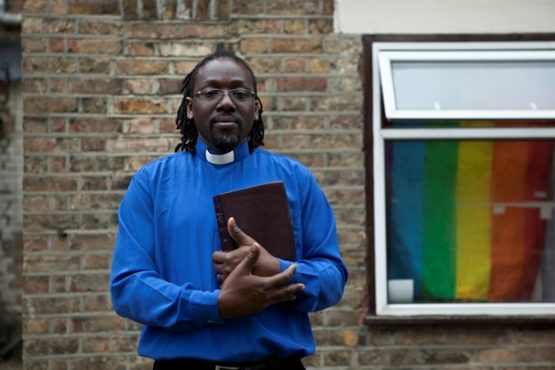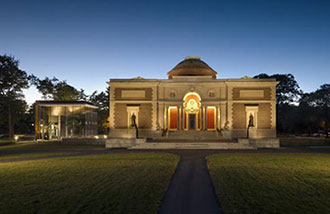
Andrew Esiebo
Nigerian, born 1978
“Untitled,” Who we are Series
2010
Photograph
Collection of Andrew Esiebo
Can religion and queerness peacefully coexist? Nigerian photographer Andrew Esiebo explores this question in his series Who we are, in which he photographs homosexual individuals in the environments where they inhabit. Esiebo’s work destabilizes stereotypical representations of homosexuals in Africa. He says, “I want to blur the attention from homosexual sexual practices (towards which the focus is too much centered) and to reflect more on issues such as love, desires, aspirations, compassion, or faith” (Esiebo 2010). In this photograph, Esiebo tackles this question head-on. The preacher has a firm grasp on the Bible while standing in front of a rainbow flag, the symbol of LGBTQ pride. In a world where people frequently use religion to justify the vilification of LGBTQ Africans, this photograph is a look into a rarely-seen synergy between faith and queerness and the few spaces of worship that serve as refuges for persecuted queer Africans.
Saidou Camara ’19
Bibliography
Esiebo, Andrew. 2010. “Who we are.” Andrew Esiebo. http://www.andrewesiebo.com/whoweare
This webpage provides additional information on the Who we are series by Eric Gyamfi himself.
Makhubu, Nomusa. 2017. “Screening the fantastic – citizenship and postcolonial theoconomies in African video-film and photography.” African Identities 15, no. 2: 208-227.
Using Esiebo’s work for the purpose of analysis, this article discusses how politics, religion, and socioeconomic status in Nigeria are visualized and negotiated in film and photography.
McGee, Robert. 2016. “Does Religion Influence Views Toward Homosexuality: An Empirical Study of 16 Countries.” Fayetteville State University, Department of Accounting. Pp. 1-22.
This article conducts a study of 16 countries, including Nigeria, to ascertain what the relationship between religion and views on homosexuality is.
Tamale, Sylvia. 2014. “Exploring the contours of African sexualities: Religion, law and power.” African Human Rights Law Journal 14, no. 1: 150-177.
Tamale explores how religion and the law intersect to control, challenge, and potentially change how Africans express their sexualities.

